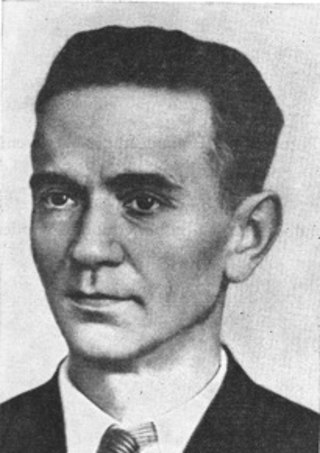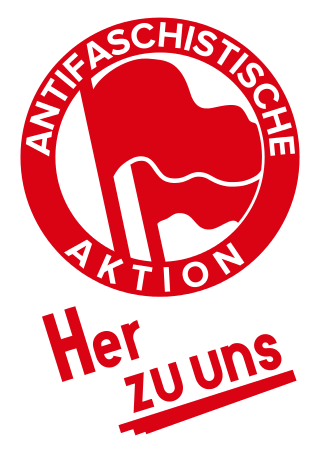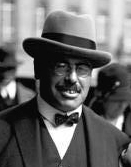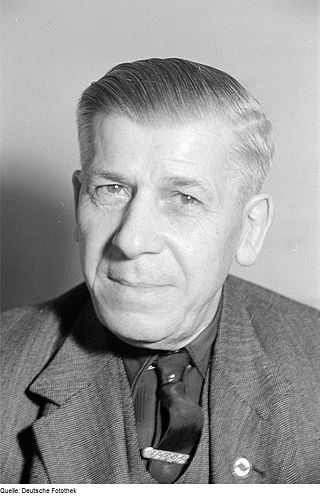Related Research Articles

The Social Democratic Party of Germany is a social democratic political party in Germany. It is one of the major parties of contemporary Germany.

Gustav Noske was a German politician of the Social Democratic Party (SPD). He served as the first Minister of Defence (Reichswehrminister) of the Weimar Republic between 1919 and 1920. Noske was known for using army and paramilitary forces to suppress the socialist/communist uprisings of 1919.

Paul Gustav Emil Löbe was a German politician of the Social Democratic Party of Germany (SPD), a member and president of the Reichstag of the Weimar Republic, and member of the Bundestag of West Germany. He died in Bonn in 1967.

Bernhard Bästlein was a German Communist and resistance fighter against the Nazi régime. He was imprisoned very shortly after the Nazis seized power in 1933 and was imprisoned almost without interruption until his execution in 1944, by the Nazis. Nonetheless, he was one of the most important leaders of German Resistance.

Antifaschistische Aktion was a militant anti-fascist organisation in the Weimar Republic started by members of the Communist Party of Germany (KPD) that existed from 1932 to 1933. It was primarily active as a KPD campaign during the July 1932 German federal election and the November 1932 German federal election and was described by the KPD as a "red united front under the leadership of the only anti-fascist party, the KPD."

Kurt Nehrling was a German SPD politician and member of the German resistance who founded the Nehrling-Eberling resistance group circa 1933. Nehrling was known for supplying intelligence to Soviet intelligence and hiding banned books. He was later arrested by the SS before being executed at the Dachau concentration camp in 1943.

Carl Wilhelm Severing was a German union organizer and Social Democratic politician during the German Empire, Weimar Republic and the early post-World War II years in West Germany. He served as a Reichstag member and as interior minister in both Prussia and at the Reich level where he fought against the rise of extremism on both the left and the right. He remained in Germany during the Third Reich but had only minimal influence on reshaping the Social Democratic Party after World War II.

The Prager-Haus or Bernhard-Prager-Haus is the former home of the Jewish Prager family, situated in Apolda, Thuringia, Germany, in Pragergasse, a narrow alley.
The Saefkow-Jacob-Bästlein Organization was an underground German resistance movement acting during the Second World War, that published the illegal magazine, Die Innere Front.

Robert Abshagen was a German Resistance fighter against National Socialism and a Communist.

Ernst Heilmann was a German jurist and politician of the Social Democratic Party during the Weimar Republic.

Rudolf Hilferding was an Austrian-born Marxist economist, socialist theorist, politician and the chief theoretician for the Social Democratic Party of Germany (SPD) during the Weimar Republic, being almost universally recognized as the SPD's foremost theoretician of the twentieth century. He was also a physician.

Carsten Schneider is a German politician of the Social Democratic Party (SPD) who has been serving as a member of the German Parliament since 1998. Since 2021, he has also been serving as Parliamentary State Secretary for East Germany and Equivalent Living Conditions in Chancellor Olaf Scholz's cabinet.

Mathilde Wurm was a German politician, social worker and journalist. She represented the Social Democratic Party of Germany and the Independent Social Democratic Party of Germany in the Reichstag from 1920 to 1933.
Fritz Soldmann was a German politician of the Independent Social Democratic Party (USPD) and later the Social Democratic Party (SPD).
Fritz Thurm was a German Social democrat politician and resistance fighter in Nazi Germany.
Hermann Kreutzer was a German political activist (SPD). As a teenager, he was caught distributing anti-government leaflets and spent the final months of the National Socialist period serving the first part of a ten year prison sentence. Towards the end of 1945 he entered mainstream politics in his home region, which was then being administered as part of the Soviet occupation zone. He campaigned against the party merger between the Communist Party and the Social Democratic Party. A further lengthy period in government detention followed. In 1956, following high level government negotiations, he was released and transferred from East to West Berlin.
Theodor Neubauer was a German communist politician, educator, essayist, historian and anti-Nazi resistance fighter.

Otto Buchwitz was a German resistance fighter against National Socialism, politician and party functionary of the Social Democratic Party (SPD) and Socialist Unity Party (SED).
References
- ↑ "For Freedom, Justice, Civil courage: The 20th July 1944", p. 43.
- ↑ ""and if anyone else wants a souvenir of me, let them each choose a book from my bookcase..."". www.lernort.weimar.de (in German). Retrieved 2024-07-15.
- ↑ "Weimar/Stolpersteine – GenWiki". wiki.genealogy.net.
- ↑ "Kurt Nehrling - laundry business". www.weimar-im.ns.de (in German). Retrieved 2024-07-15.
- ↑ "Personal file of NEHRLING, KURT, Born on 13-Feb-1899". www.collections.arolsen-archives.org. Retrieved 2024-07-15.
- ↑ "Harry Stein + Udo Wohlfeld – Social Democrats against Hitler – The Nehrling-Eberling resistance group in Weimar (2003)". www.meinsammelsuriumblog.wordpress.com (in German). Retrieved 2024-07-15.